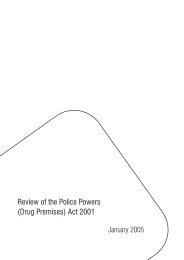Crimes (Forensic Procedures) Act 2000 - NSW Ombudsman - NSW ...
Crimes (Forensic Procedures) Act 2000 - NSW Ombudsman - NSW ...
Crimes (Forensic Procedures) Act 2000 - NSW Ombudsman - NSW ...
You also want an ePaper? Increase the reach of your titles
YUMPU automatically turns print PDFs into web optimized ePapers that Google loves.
Recommendation 15<br />
Police consider informing suspects who have been taken into detention after arrest, and who are likely to<br />
undergo a forensic procedure, that police may wish to conduct a forensic procedure on the person, such as a<br />
DNA sample, and that this information be provided when police give suspects their summary of the provisions<br />
of Part 9 of the Law Enforcement (Powers and Responsibilities) <strong>Act</strong> 2002.<br />
<strong>NSW</strong> Police supports this recommendation and has advised that it will consider updating its procedures to include<br />
this information. 432<br />
6.2.5. Improving access to legal advice<br />
Many submissions argued that access to legal advice should be improved. Some advocated establishing a 24 hour<br />
telephone hotline for people who have been detained by police. 433<br />
There were also suggestions that suspects and volunteers be given notice prior to police requesting consent to<br />
a forensic procedure, so they can seek legal advice if they wish. The Anti-Discrimination Board argued this would<br />
enable suspects and volunteers to be better informed about the procedure and its consequences before deciding<br />
whether to consent or not. 434 The Police Association of <strong>NSW</strong> also suggested that suspects and volunteers be given<br />
a copy of the information sheet beforehand, to give them the opportunity to go through the information with a legal<br />
practitioner. 435<br />
Some other jurisdictions provide for notice periods before taking DNA samples. 436 These tend to relate to samples<br />
taken by compulsion, but could be adapted for samples taken by consent.<br />
Obviously it would not be appropriate to give notice for some types of forensic procedures, like gun shot residue<br />
tests, nail scrapings or photographs of injuries. These have to be taken while the suspect is in custody or the<br />
evidence will be lost. However, a person’s DNA can be taken at any time. As discussed above, giving notice before<br />
asking for consent to a forensic procedure, and providing information about the procedure with the notice, could<br />
improve access to legal advice, ensure suspects and volunteers are better informed, and shorten the length of time<br />
the person spends in police custody receiving information and waiting for legal advice.<br />
There are several reasons why providing notice may not be appropriate where police wish to take a DNA sample<br />
from a suspect who is under arrest. First, it is much more convenient to conduct the procedure while police have the<br />
person in custody, rather than attempting to carry it out at a later date. Second, police may wish to carry out other<br />
forensic procedures, which have to be carried out straight away, before the evidence is lost. In those circumstances,<br />
police would still have to provide the suspect with the relevant information and the opportunity to seek legal advice.<br />
Third, police will in some circumstances have the power to compel the person to provide the sample regardless of<br />
consent. Finally, there is the possibility that providing advice in advance of a forensic procedure may increase the risk<br />
of the person absconding.<br />
These considerations do not apply to volunteers or suspects who are not under arrest, and in our view there would be<br />
considerable merit in providing these people with notice about intended forensic procedures. This approach seems to<br />
be supported by the Police Association of <strong>NSW</strong>. In its submission, the Association suggested that “one better option<br />
would be to give the suspect the Information Sheet prior to the procedure for them to read or go over with their lawyer<br />
and then simply explain the gist of the information in language more suitable”. 437<br />
In our draft report, we made a provisional recommendation, that the <strong>Act</strong> be amended “so that police are required to<br />
give volunteers and suspects who are not under arrest a period of notice, specified in the <strong>Act</strong> or Regulation, before<br />
asking them to provide a DNA sample.”<br />
<strong>NSW</strong> Police did not support this recommendation, commenting:<br />
<strong>NSW</strong> Police has reservations about being able to comply with such requirements. Additionally, it is believed that<br />
investigations may be unnecessarily hampered or delayed, and suspects and volunteers may be unnecessarily<br />
inconvenienced. 438<br />
80<br />
<strong>NSW</strong> <strong>Ombudsman</strong><br />
DNA sampling and other forensic procedures conducted on suspects and volunteers under the <strong>Crimes</strong> (<strong>Forensic</strong> <strong>Procedures</strong>) <strong>Act</strong> <strong>2000</strong>

















